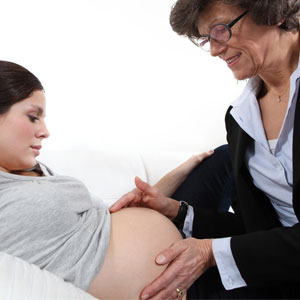
Women cared for by midwives throughout pregnancy tended to have less-complicated births and were less likely to go into labour earlier than women getting standard medical care, according to a new review of more than a dozen studies.
Pregnancy care that was led or entirely provided by hospital- or community-based midwives was linked to fewer epidurals, episiotomies and use of instruments like forceps or vacuums during delivery.
Risk of losing the baby during the first two trimesters was also significantly lower, UK researchers found. It's important to figure out why those differences exist for midwife-led care, said lead author Jane Sandall, professor of social science and women's health in the Division of Women's Health of King's College London.
"For example, whether it is the model of care itself where midwives are in a position to pick up problems and get the right specialist input as early as possible, or whether a relationship where a women knows and trusts her midwife leads to a better outcome," Sandall told Reuters Health by email.
In some countries, including the US, an obstetrician or family doctor takes responsibility for women's care during pregnancy, but midwives may assist the expectant mother in preparing for pregnancy and deciding when a doctor's attention is needed.
Models of pregnancy
Those "medical" models of pregnancy care were weighed in 13 studies covering
16 000 women against models in which a licensed midwife takes primary
responsibility for a woman during pregnancy and is also the primary caregiver
during birth and postpartum – which is the most common model in New Zealand,
for example. Women with midwives were 23% less likely to give birth prematurely
and 19% less likely to lose the foetus before 24 weeks of gestation.
After 24
weeks, though, foetal death was equally common with all care models, according
to the review in The Cochrane Library. Caesarean-section births tended to be
equally common with midwife-led care or medical-model care, though women with
midwives laboured for about 30 minutes longer than others. The percentage of
women attended during delivery by a caregiver they knew ranged from 63% to 98% for
midwife-led care and 0 to 21% for other models, including obstetrician-led
care.
The authors emphasise that continuity, in which a midwife has a close relationship with the mother from early pregnancy to several months after birth, may help caregivers spot complications early on and account for the difference in birth experiences. With obstetrician-led care, they write, often the doctor who has been caring for the woman during pregnancy is not the obstetrician present at birth.
"When women know and trust their caregiver
they often have a better experience," said Caroline Homer, head of the
Centre for Midwifery, Child and Family Health at University of Technology,
Sydney, Australia.
Cared for by strangers
"No-one really wants to be cared for by strangers! "Sandall and her colleagues caution that the studies in their review mostly excluded women with high-risk pregnancies or substance-abuse problems, which would also make a pregnancy higher-risk. The studies were also limited to hospital-based births and licensed midwives, so they do not reflect the use of lay or traditional midwives, home births or conditions in less developed countries.
Some, but not all of the studies involved women who were
randomly assigned to a medical or midwife-led model of care, so the review
cannot prove there were no other differences between groups of women that might
account for their different experiences.
Still, women seemed to be more satisfied with midwives than with other models and also seemed to save money on medical care, which may be the result of needing fewer costly medications and procedures, as well as the lower salaries among midwives compared to medical staff salaries, the authors wrote.
Dr James Byrne, chairman of the obstetrics and gynaecology department at Santa Clara Valley Medical Centre in San Jose, California, said, "The cost of care difference was only 5%, which isn't actually a large difference."People in the US tend to assume that midwives cost a great deal less than doctors, but that's not really the case, said Byrne, who was not involved in the new study.
Highly trained
The review includes reports from countries in the UK (and Commonwealth), where midwives are highly trained, with nursing degrees and years of experience, Byrne points out.
"In the US, we have equivalent certified nurse-midwives, but we also have professional or lay midwives, who have less training and would actually be illegal in many of the UK countries," said Byrne, who is also an associate clinical professor at the Stanford University School of Medicine.
It is possible for women in the US to get the same kind of care as the women in the review, he said, but it's not the first option in the US. "In the other countries, where midwife-led care is more strictly regulated, that is the first option for all women, and often includes consultations with other healthcare providers, like obstetricians," Byrne said.
"The main takeaway for women should be that a team of coordinated caregivers monitoring them throughout pregnancy is the best choice, regardless of their degrees," Byrne said.




 Publications
Publications
 Partners
Partners










